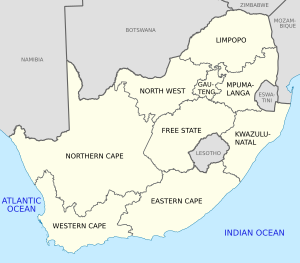 Image via Wikipedia
Image via Wikipedia
The Salvation Army, together with Saatchi & Saatchi Cape Town, has set out to lift the veil on child trafficking with an innovative outdoor campaign to inform the unknowing South African public about the severity of human trafficking, the fastest growing criminal industry in the world.
1.2 million children are trafficked each year and it's estimated that these numbers will rise dramatically in 2010. The International Organization for Migration (IOM) contends that globally human trafficking has an annual turnover of US$32 billion, making it the third most lucrative criminal activity after the narcotics and weapons trades, although in contrast to these other criminal activities, the penalties for human trafficking in most countries are much less severe, or non-existent.
Major Marieke Venter of The Salvation Army says, "Modern day slavery 'works' and thrives because of its great profitability. This industry is continuously growing because of the high demand, ease of supply and lack of awareness. That coupled with the absence of effective laws will allow this industry to continue without much resistance."
Ian Young, Managing Director of Saatchi & Saatchi Cape Town says, "We decided that an unusual approach would work in generating the much needed awareness around this issue," he adds. "We took an ordinary toy crane machine, gave it a sinister twist and created a new game called 'Little Treasures'."
He says that the machine was filled with cute dolls, wrapped in seemingly innocuous illustrations and then placed in a popular shopping mall on a busy morning.
Image
"People of all ages were instantly drawn to the innocent looking game and the treasures within. After playing and snatching a prize, the truth was revealed via a message attached, that each doll represented a child lost to the business of human trafficking."
He stresses that the media in South Africa is the most powerful medium of communication to the diverse cultural groups in SA.
"With this in mind, this week we launch the mechanism of this campaign to the top media houses in South Africa to create the awareness right at the core of communication."
"We are excited that the media are willing to get involved in this campaign and trust that they will give this issue the presence it deserves," he adds.
Trafficking in human beings, especially women and girls, is not new. Historically, it has taken many forms, but in the context of globalization, has acquired shocking new dimensions. It is a complex, multi-faceted phenomenon involving multiple stakeholders at the institutional and commercial level. It is a demand-driven global business with a huge market for cheap labor and commercial sex confronting often insufficient or unexercised policy frameworks or trained personnel to prevent it.
The primary driving force for the supply is poverty, with associated poor education standards and lack of employment opportunities that propel vulnerable people into the hands of traffickers. The trafficking industry, responding to growing demands for cheap, malleable labor and an expanding, globalized sex industry guarantees a ready supply to satisfy that demand.
South Africa is commonly regarded as the main country of destination for trafficked persons in the region. In many cases, women and children are lured to South Africa with promises of jobs, education, or marriage only to be sold and sexually exploited in the country's major urban centres, or in small towns and more rural environments. There is also some indication that men are being trafficked into the country for purposes of forced labor, particularly in the agricultural sector.
Africa has the highest percentage of child laborers in the world with 80 million (41%). Between five and 14 years old, the largest percentage is young girls engaged in domestic work. Many of these children are victims of trafficking for forced labor, put in exploitative situations by intermediaries and powerful agents known to their families.
The most devastating fact is that African traffickers face low risk of arrest, prosecution or other negative consequences. They have exploited the lack of rule of law, the non-implementation of existing anti-slavery laws, and corruption of judicial systems. These lapses allow perpetrators to go unpunished. Prosecutions are rare and fraught with difficulties.
According to Major Venter, "very often the users of human trafficking do not perceive themselves as part of the trafficking network, although they are in fact, an engine in the machinery of exploitation."
Daily News - Saatchi & Saatchi: “Little Treasures” Game Lift Veil On Human Trafficking - TAXI: The Global Creative Network
![Reblog this post [with Zemanta]](http://img.zemanta.com/reblog_e.png?x-id=d3e7b9c3-1dc8-45a2-a9d0-7f474ab37757)

No comments:
Post a Comment